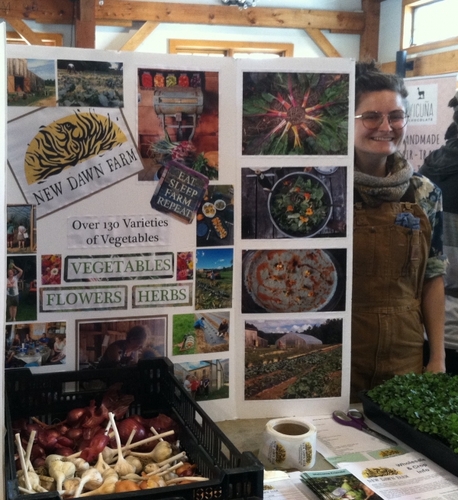On the first day of spring, Stonewall Farm hosted the Food Connects and Monadnock Menus 2018 Local Food Trade Show.
Upstairs in the visitor center's bright, sunny community room, 25 regional food producers gave out information and samples of their wares to approximately 70 attendees. Most were buyers representing local retail stores, restaurants, schools, and other food-service operations.
Food Connects, which merged with Monadnock Menus last autumn, is a nonprofit that started in 2013 with a mission to deliver “locally produced food as well as educational and consulting services aimed at transforming local food systems.”
Through its Food Hub, Food Connects sells fruit, vegetables, meats, dairy foods, and value-added items from 45 local farmers and producers.
Their customers include approximately 100 wholesale buyers in schools, hospitals, nursing homes, and retail and cooperative stores in Windham County and a small part of Windsor County in Vermont, and Cheshire County in New Hampshire.
Connecting with buyers
This was the first local food trade show Food Connects organized, said Administrative and Marketing Manager Sarah Loomis.
“Our goal is to highlight amazing local food in the hub, and connect with our buyers,” Loomis said.
With Food Connects adding nine new producers to the Food Hub in the last calendar year, “now is a good time” for a trade show, Loomis noted.
The new producers include Newfane-based Vermont Quince, Bousquet Smoke House in Westminster, Maple Mama Spritzers from Wendell, Massachusetts, Keene's Little Greens, and Vershire's Shire Beef.
During the show, Nikolaus Horster, Shire Beef's owner, was taking advantage of the above-freezing temperatures by grilling his company's all-beef hot dogs outside the building's entrance.
Inside at the show, attendees sampled items in nearly all categories of foods and beverages - fruit, vegetables, bread, meat, coffee, soft drinks, cheese, and dessert.
Brattleboro-made foods included Commonwealth Dairy's new Skyr yogurt and Grafton Village Cheese Company's line of flavored and aged cheddars, including their new white pepper and shallot variety.
Stonewall Farm was also represented, beyond providing the show space. Alex McCullough, the Food Hub manager, noted the hub distributes the farm's produce and cheese.
When Food Connects absorbed Monadnock Menus this past year, the time was right to have a dual-state trade show, McCullough said. “Our plan is for the trade show to grow,” he noted.
The goal of the trade show, McCullough said, “is not just for producers to vend” at the show, “but to generate interest in the products so we can get repeat buyers.”
The Food Hub's goal, he said, “is to transition the food system by creating and opening up markets for producers. On the customer side, we want to tell the story that there are so many producers in their backyard. It's an exciting time to talk about food hubs in the northeast.”
'Growing momentum'
When asked if he's seen an increase in food producers in this part of New England, McCullough said, “My sense is, there is growing momentum in specialty food producers. There's an interest in expanding into wholesale, to go beyond direct sales through farm stands and CSAs [Community Supported Agriculture]. Producers are looking for secondary outlets, for opportunities to grow into wholesale distribution.”
Food Connects can help them grow, McCullough said, by providing a market.
Loomis noted the organization “builds relationships - we offer marketing ideas and wholesale guidelines,” especially for producers new to wholesale operations.
“As a locally-oriented nonprofit, we have an agility a larger company wouldn't have,” said McCullough. “We can accommodate more producers with limited stock. Our buyers know that not everything is available all the time.”
One buyer who attended the trade show was Steve Hed, sustainability coordinator at the Putney Central School. One part of Hed's job is food-service manager - he does the purchasing for the school's cafeteria and after-school meals program.
“We're an independent food-service operation,” Hed said. Rather than contract the cafeteria to an outside entity, like most schools in the Windham Southeast Supervisory Union, Putney Central School runs its own kitchen.
Being independent means “we have more options on what we purchase,” Hed noted.
The school and Food Connects have sort of grown up together, Hed said. When the school started its farm-to-school program and created its independent kitchen, Food Connects had also just emerged from the former entity known as Windham Farm & Food.
“You need a fairly developed infrastructure” to successfully operate a school kitchen, he said. Food Connects got grant funding to supply the school with appliances and utensils for preparing and serving fresh fruits and vegetables.
Investing in healthy kids
Although Hed was already familiar with many of the products at the trade show, “it's nice for me to meet the farmers and producers face-to-face,” he said. “I met four farmers today that I've bought stuff from them but had never met. I also met new ones today, and I'll probably buy their products for a future meal,” Hed added.
Buying from the Food Hub and “ultra-locally” fits in with the school's philosophy of “How can we support local farmers?” Hed said. “This will build the local economic community to ensure they're there in the future,” he noted.
“School food budgets are tiny, which doesn't make any sense,” said Hed, who noted, “people are always looking at dollars and cents, they're quantifying things. They should look at it qualitatively, as in, 'What are our kids eating?' We spend money on their education, but what about the kids' food?”
“We're fighting for every penny we get in school budgets,” he said, and urged taxpayers to instead look at “how much money we're putting right back into the local economy” by purchasing food grown and made by locals. “Rather than send tax money to California, we're sending it right back to the taxpayers. Look at what that creates!” Hed said.
“It may be more expensive in the beginning” to purchase locally-produced food, said Hed, “but in the long run it's an investment in the kids, and that's what we need to get the public to understand.”
